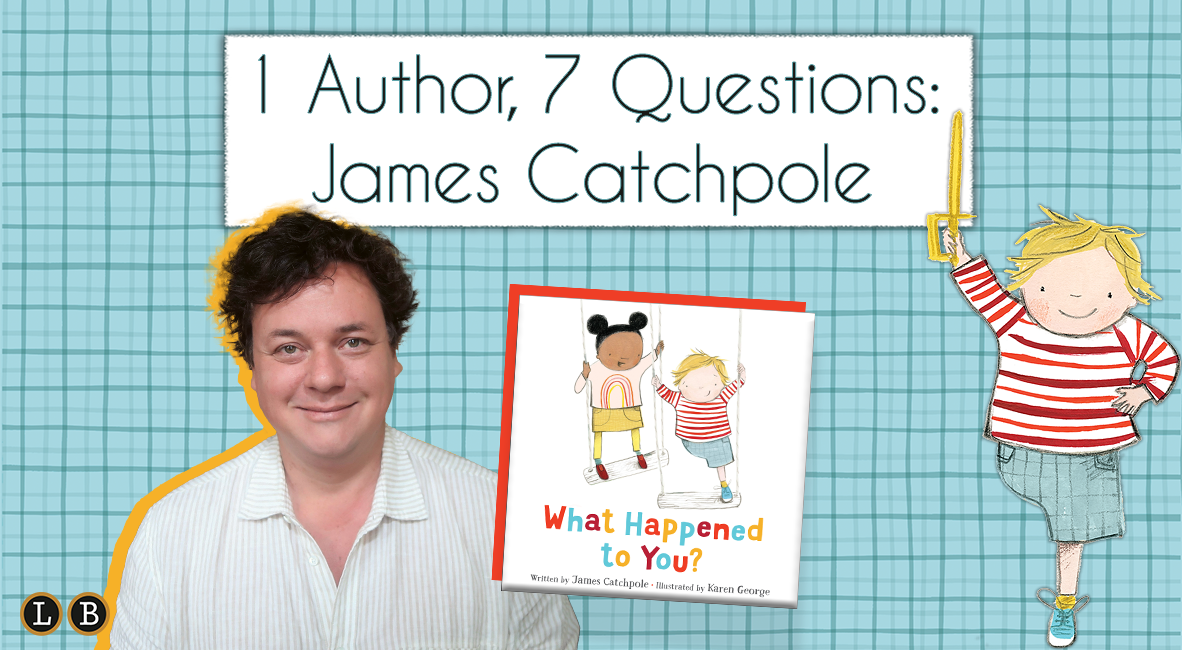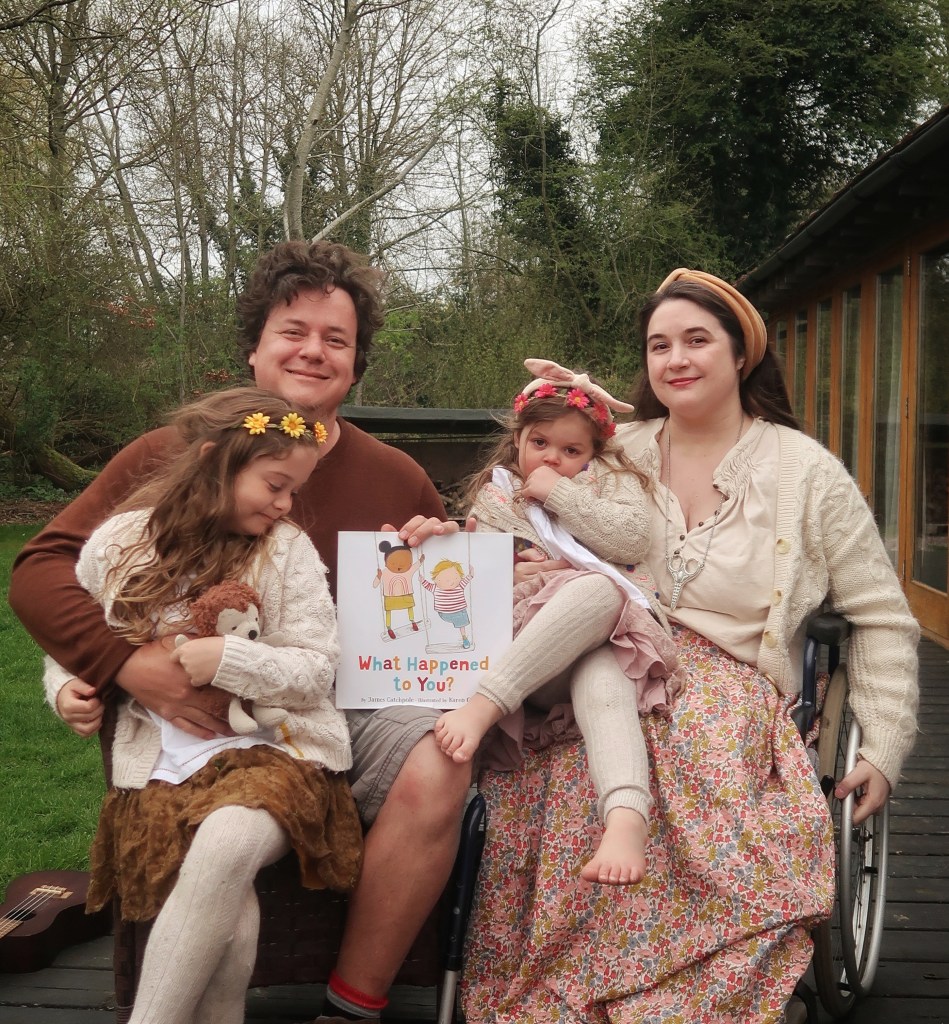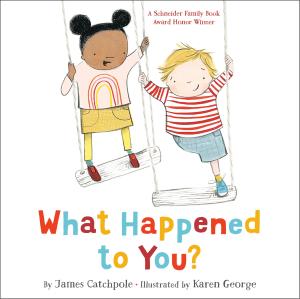1 Author, 7 Questions: James Catchpole

Ahoy mateys! What Happened to You? by James Catchpole, illustrated by Karen George has come to port and you must meet our new favorite pirate, Joe! We sat down virtually with author James Catchpole to talk all about this silly, heartwarming, accessible tale of a boy with one leg and the many questions he faces on the playground.
Many people with a physical difference or disability will relate to Joe. I, myself have an eye condition that has prompted many innocent, yet sometimes frustrating questions. Can you talk a bit about your inspiration to write What Happened to You? Is this a story you’ve wanted to tell for a while?
I suppose the story must have been dormant within me for much of my life. I’m a literary agent really, more than an author, and I’ve been reading the submissions for the family business since I was a teenager. In that time, plenty of stories about disability have come my way, almost all written by non-disabled writers, and none have rung true to me as an amputee – as someone with a very visible difference. I never consciously set out to write my own story, but eventually the opportunity presented itself, and the theme of intrusive questions was the first thing that came to mind.
The daily questions that visibly disabled people face – kids especially – are often the hardest thing about being disabled. Even when innocent in intention (and that’s often the case, whether from children or from adults), their effect is no less frustrating. They single you out from your peers as different and ask you to recount something deeply personal (often, traumatic) to satisfy a passing stranger’s curiosity. And they deprive you of the right to privacy that everyone else enjoys, because they say: for you, personal questions are no taboo.
The reality of intrusive questions wasn’t something I’d ever seen covered before in a picture book, and in fact the cultural consensus goes the other way: it says, ‘just ask!’ So that seemed like an opportunity to try to shake things up!
I love Joe! I love Simone! And I love their crew of pirate friends! Who is in your pirate crew, cheering for you, playing with you, and just letting you be you?
I had the great good fortune to be matchmade by my cousin with a friend of hers who also had a disability. My cousin maintains disability had nothing to do with it – she just thought we’d get on… and we did. We’ve been together for 19 years now. But both being disabled – and having such utterly different experiences of disability – really did help us make that first connection. I’ve pretty much always had a disability, whereas Lucy acquired hers as a young woman, which meant she, unlike me, had to think everything through. So she pretty much explained me to myself!
Our two daughters would find it very odd indeed to have a two-legged father and a mother who didn’t use a wheelchair, so they definitely let me be me, in the very purest sense. And indeed, before all that I had a close crew of friends at school who never really asked what had happened to me. Maybe they knew from their parents and that was enough, but they never brought it up, and I never noticed that they hadn’t. It didn’t seem very important to any of us.
Karen George’s illustrations are fantastic, and I love how detailed and expressive her work is—while also using white space so brilliantly. What are some of your favorite moments and details from the art?
I’ve many, many reasons to be grateful to Karen, not least for sending me a story about a one-legged teddy bear and having the grace to accept my analysis of why it didn’t ring true, and then – even more generously – my offer to write her a new one. That teddy bear eventually morphed into Joe, and because we started off working together before we had a publisher on board, we were able to drill down into every detail of body language and emotional expression together.
Publishers often keep author and illustrator apart, but on a story as personal as this one I think it was crucial for Karen and me to have that direct line of contact. It accounts for quite how well she’s managed to catch my physicality and somehow project it onto a five-year-old version of me. There are details in the way Joe carries himself on every spread that make me pinch myself. But of course, the wordless spread – which was actually the publisher’s suggestion – makes such an impact…
You have a great note to parents at the back of the book about how to approach their curious child’s questions. What would you tell parents of a disabled child facing similar interactions as Joe on the playground?
This is an intriguing question, because parents of disabled children often come at this from a very different angle than do disabled adults. You can clearly see the gulf between the two sides on social media. It’s a problem, and it’s worth speculating as to why the difference in approach is often so pronounced. I’ll summarise some of my thinking on this below, but I’ve explained myself more clearly in conversation with Madeline Cheney on her podcast The Rare Life, where we try to build a bridge across that divide.
Disabled kids may start off feeling they need to answer intrusive questions with some version of the truth, but very often their feelings on this change as they grow up. Parents of disabled kids, on the other hand, often accept an argument promulgated by medical systems and charities that the way to ensure their child is accepted by the world is the spreading of ‘awareness’. In practice, this often means taking it upon themselves to educate any curious stranger about their child’s medical diagnosis.
This ‘just ask!’ approach is then modelled for the disabled child, who will accept that obligation as their own, not least because the world seems to expect it already. But disabled children are not teachable moments! And going down this road risks othering disability more than it normalises it. Parents of disabled children face intrusive questions on a daily basis too, and it can’t be easy finding the right way to deal with those questions politely while protecting their and their child’s boundaries. But if they don’t do so, then it will be hard for them to help their child negotiate those questions and set their boundaries as they grow up. For the best guidance on this, parents of disabled children should surely turn to disabled adults, who’ve had a lifetime wrestling with this issue. Disabled parents of disabled children like @nina_tame and @ableismistrash are especially insightful in this regard, as you might imagine.
You and your wife, Lucy, are both dedicated, strong activists in the disability field. What is it like working together on those projects?
Ah! Honestly, it’s joyful. Lucy and I have been having this conversation together since our first date, so for that dialogue to bear fruit in book-form, and for those books to go out into the world and find their readers… It feels like catharsis. We have such different experiences of disability, and we’re both fascinated by how the world responds so differently to us, because of the nature of our disabilities, and because of gender and how the two intersect. Maybe there’s a more academic book in all that, one day, and maybe some of our writing on this subject on social media points in that direction. It’s certainly rewarding when it seems to touch people online…
But there’s a different kind of power in being able to write a first-person story about a disabled child, and to see it being read in homes and schools all over your country, and then in other countries, and in translation and on the far side of the world – and all the time being read by grown-ups to young children who immediately connect with Joe and see his point of view. That feels like more than catharsis, actually. It feels quite extraordinary.

I am in love with your Instagram account @thecatchpoles! Just wanted to put in a plug for it so all our readers go follow your family immediately! Your account seems to be a whole-family effort. Can you tell us a bit about how you come up with new content?
Thanks Mara! Lucy has always been an avid photo-taker, so visual content was always going to exist. And her disability restricts her mobility so much that family life was always likely to be her subject, even if she didn’t happen to love dressing the girls in sad, beige linen. (Ok, I admit it – I love the sad, beige linen, too.) More seriously, there’s a natural overlap with disability activism in posting pictures of our family life, because the stereotypes around disability are such that our both being disabled parents and still managing to rear seemingly happy and reasonably well-turned-out children (the clothes may be sad but the kids aren’t!) feels like a valuable thing to do. It wasn’t easy to find images of disabled parents in the media when we were younger, so I hope we’re serving a need for younger generations of disabled people, too.
What’s next? Are you able to share about any upcoming projects you’re working on? 🙃
Joe rides again! There’s a sequel called You’re So Amazing! which is coming out in the UK next month, and in the US next year. Again, it’s about my childhood experience of having one leg and learning to deal with some of the strange ways people responded to me, but for this second book the impetus was Lucy’s rather than mine. She came up with the core of the story, in these lines:
‘Joe was amazing.
He knew he was amazing,
because everyone kept telling him
he was amazing.’
Well, she wrote ‘inspirational’, which is the word we hear more as adults, and I changed it for ‘amazing’, which is what Joe would hear, as a child – which pretty much encapsulates what each of us brings to the table. Then we haggled out a beginning and an end, drafting and redrafting together. So this one’s officially by James and Lucy Catchpole. I’m not sure I’d have had enough distance from my own experiences to have known how to put them into a story by myself, without Lucy… But then, I could say the same about What Happened to You!
What happened to you? Was it a shark? A burglar? A lion? Did it fall off? A boy named Joe is trying to play pirates at the playground, but he keeps being asked what happened to his leg. Bombarded with questions and silly suggestions, Joe becomes more and more fed up…until the kids finally understand they don’t need to know what happened. And that they’re wasting valuable playtime!
Based on the author’s real childhood experiences, this honest, funny, and authentic picture book is an empowering read for anyone with a disability, and for young readers learning how best to address differences.
